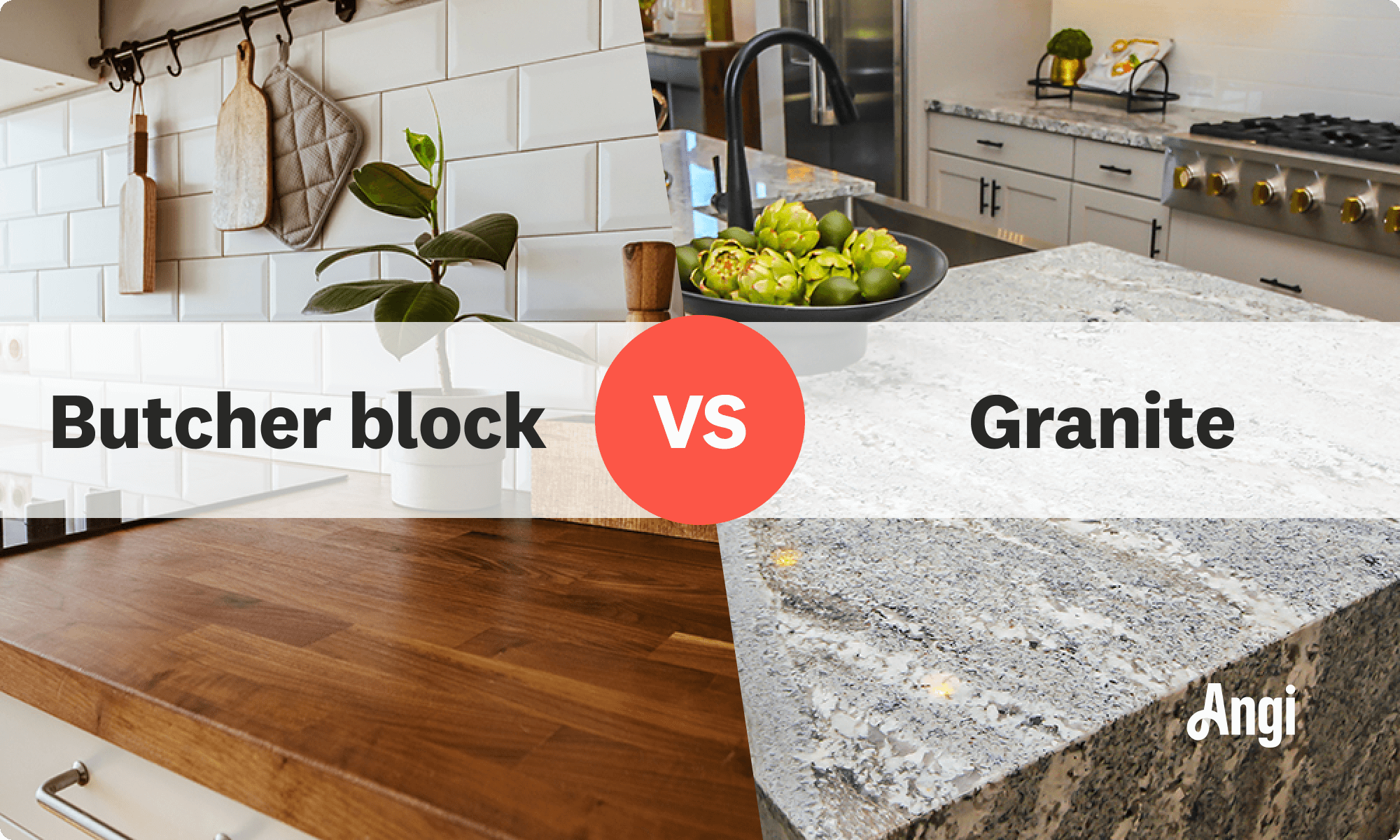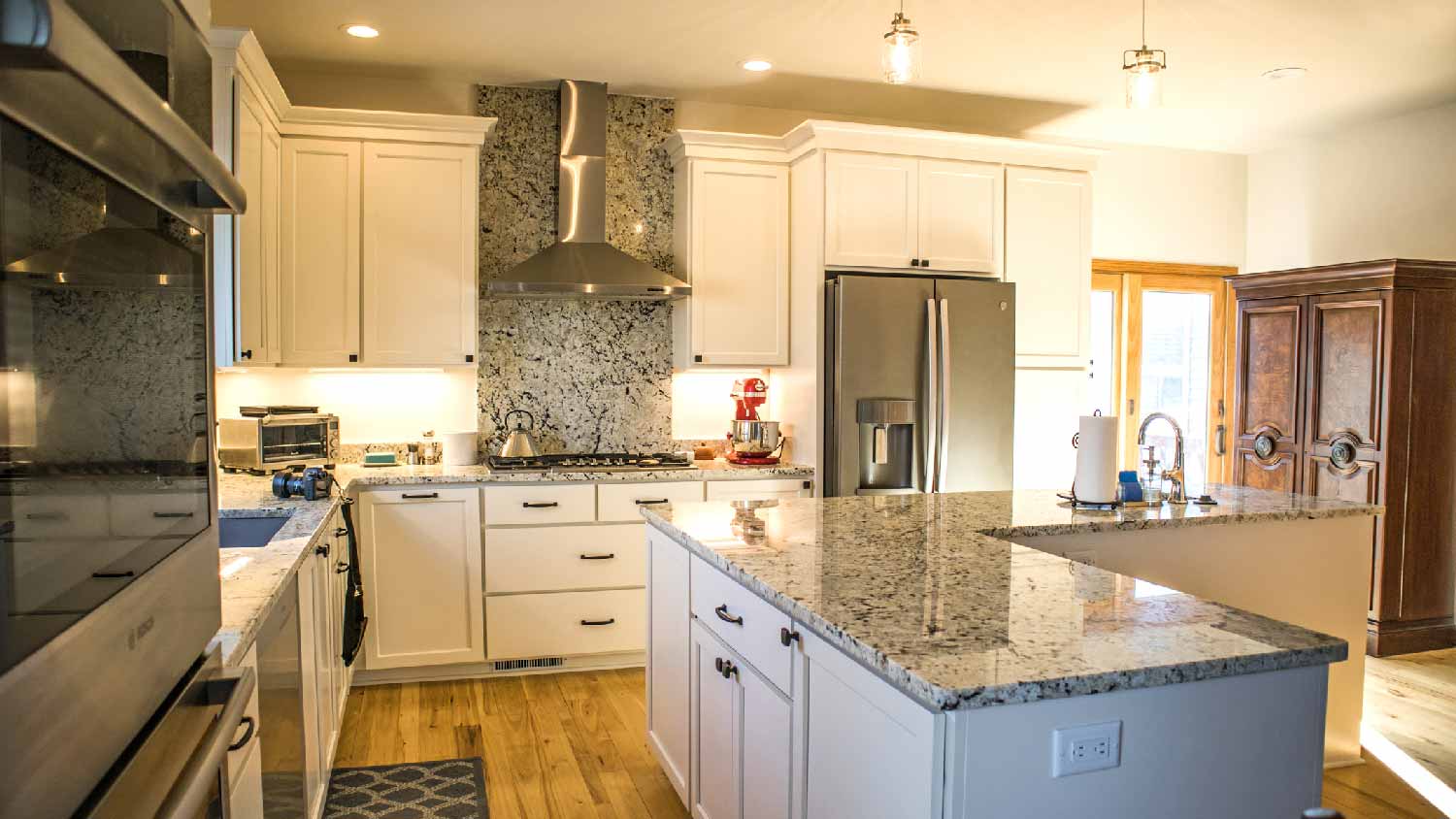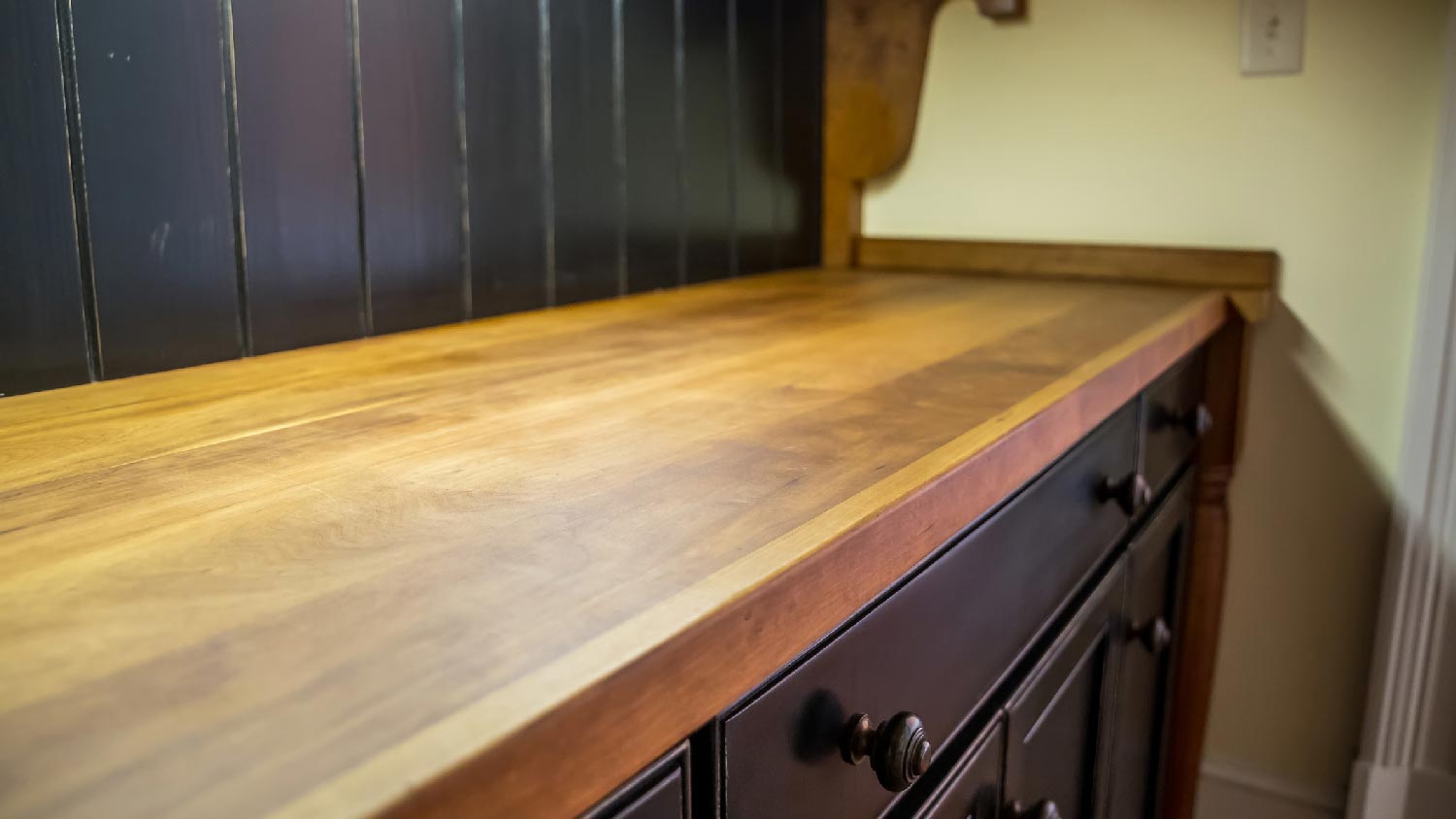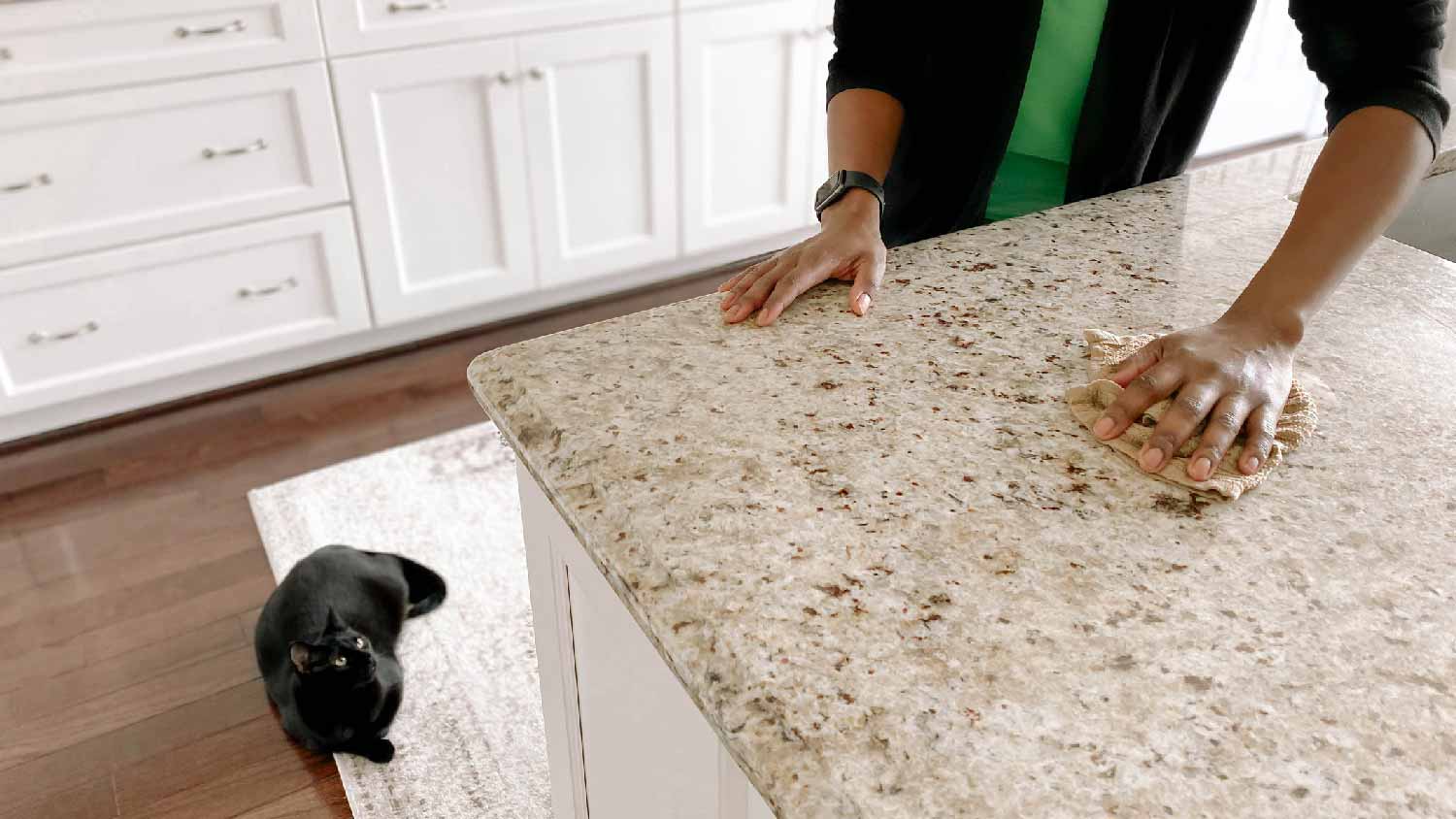Butcher Block Countertop vs. Granite: Which Is Right for You?
Wood vs. stone: A timeless battle


Butcher block countertops offer a warm, rustic aesthetic.
Granite countertops are a classic option for busy kitchens.
The cost of butcher block and granite is relatively similar.
Granite is a low-maintenance option.
Butcher block can double as a food prep surface.
Countertops see a lot of use. From acting as a food prep area to a place for kids to drop their things after school, the countertop you choose will need to do double, triple, or even quadruple duty in your home. If you’re choosing between a butcher block countertop versus a granite countertop, the final choice will come down to the aesthetics of your kitchen and how much time you want to spend on maintenance.

Butcher Block vs. Granite Countertops: Key Differences
Butcher block vs. granite countertops have a few key differences that you should consider before deciding on the best countertop material for your home. Butcher block is a desirable countertop material because it offers a warm and rustic element on which you can prepare food without the need for a cutting board. Granite is a classic material that is low maintenance and offers a high-end aesthetic.
What Are Butcher Block Countertops?
Butcher block countertops are made from wood and offer added kitchen convenience because food can be prepared directly on the surface instead of using a cutting board. The rustic and warm appearance of butcher block countertops is thanks to natural wood. They are manufactured from individual pieces of wood, typically walnut, birch, and oak, which are glued together and then sanded and sealed to create a distinct patchwork design showcasing the wood grain and color variation.
| Pros | Cons |
|---|---|
| Doubles as a food preparation surface | Needs regular maintenance |
| Achieves a warm, rustic aesthetic | May warp when in contact with water |
| Easy to cut to size and install | Not as durable as granite, Corian, or other materials |
Best for:
Kitchens that have a warm and cozy aesthetic
Homeowners who want to prepare food directly on the countertop
Those who want to save some money and possibly install the countertops themselves
Pros of Butcher Block Countertops
One of the main pros of a butcher block countertop is that it can double as a cutting board. If you like the idea of getting rid of your cutting boards and streamlining food prep, then this may be the best choice—but you can still use cutting boards if you prefer. When properly maintained, butcher block countertops can last a long time and can be refinished multiple times if the need arises.
Cons of Butcher Block Countertops
Because wood is naturally porous, butcher block countertops need to be resealed periodically to prevent moisture, dirt, and bacteria from getting into the wood and causing it to warp or breed germs. If you do choose to use it as a food preparation surface, it will likely develop nicks and scratches that can later be sanded out, but refinishing butcher block requires a substantial amount of work.
What Are Granite Countertops?

Granite countertops are fabricated from large slabs of granite and then buffed until they shine. They are nonporous and feature a stunning array of different patterns and colors, with types of granite ranging from deep black to light pink. Minerals that make up granite countertops are typically quartz and feldspar, and the specks and veins are thanks to minerals like mica, potassium, and labradorite.
| Pros | Cons |
|---|---|
| Highly durable and heat- and scratch-resistant | Difficult to repair if they’re scratched or damaged |
| Very low maintenance | May need to be resealed |
| Lots of styles and colors to choose from | Typically requires professional installation |
Best for:
Busy homes that need a low-maintenance surface
Homeowners who want a classic, high-end countertop aesthetic
Those with a bigger budget to cover the purchase and installation
Pros of Granite Countertops
They are highly durable and scratch- and heat-resistant. Because granite is naturally nonporous and is often sealed by the manufacturer, the surface can be easily wiped off and maintained. Granite offers a range of colors and patterns and can be a true statement piece in the kitchen.
Cons of Granite Countertops
Along with the pros of granite countertops also come a few cons. Though scratch-resistant, they’re not scratch-proof, and if they get scratched, they’re difficult to repair. In some cases, they may also need to be sealed if they seem to be absorbing water or stains.
Butcher Block vs. Granite Countertops
Appearance: Tie
Butcher block and granite are visually appealing and can complete a kitchen’s look. But while it’s a tie as far as general appearance is concerned, the one that will look best in your kitchen depends on the aesthetic that you’re going for. Wood brings a natural warmth and can complete a casual and inviting kitchen. Granite offers a cooler look that is perfect for more formal kitchens that would benefit from the luxury of natural stone.
Options and Customizations: Granite
Wood countertops vs granite offer natural warmth and variation in the wood grain’s tone and texture. But when it comes to options and customization, granite pulls ahead. Granite countertops offer various colors and patterns depending on where they’re quarried.
Durability: Granite
Granite is cut from stone slabs and is a highly durable material. It can stand up to heat and resist scratches, and because it’s naturally nonporous, it is also water and stain-resistant. Butcher block countertops aren’t as durable as granite, and if you use them for a food prep surface, they will become scratched and worn over time. If they’re not sealed properly, they can also warp if they have sustained contact with water.
Price: Tie…sort of

Granite countertops cost between $2,000 and $4,000, with an average cost of $3,200. Butcher block countertops cost between $2,000 and $5,000, with an average cost of $3,500—and on the high end, both can cost upwards of $15,000 or more for custom jobs. While this looks like a tie at first glance, other factors must be considered.
Granite can cost up to $200 per square foot for a high-end granite slab, and installation costs can be more expensive if it needs to be custom cut. But granite doesn’t require any maintenance throughout its life. Butcher block can also cost up to $200 per square foot, but installation costs are typically lower than granite because it’s an easier material to work with, and you may even be able to install them yourself. They also require regular maintenance to reseal them periodically, and if you prepare food on them, they may need to be sanded down and refinished.
To achieve your kitchen countertop ideas on a budget, you may want to look at other materials or paint your existing countertops. You can also contact a countertop installation professional near you to get estimates on multiple materials.
Ease of Installation: Butcher Block

Granite is incredibly heavy—a block of stone, after all—and typically requires professional installation. Butcher block, on the other hand, is much lighter and easier to work with. It can be cut with standard woodworking tools, so if you’re a DIYer and want to install countertops independently, butcher block may be the way to go.





- Butcher Block vs. Stone Countertops: Which Is Best for Your Dream Design?
- Butcher Block Countertop Pros and Cons
- How Long Do Granite Countertops Last?
- 11 Benefits of Granite Countertops for Your Home
- Pros and Cons of Granite Countertops: A Buyer’s Guide
- 17 Beautiful Granite Countertop Alternatives
- How to Install Granite Countertops: A Complete DIY Guide
- How to Change the Color of Your Granite Countertops for a Brighter Kitchen
- What’s the Difference Between Concrete vs. Granite Countertops?
- The Top 7 Types of Granite Countertops to Consider for Your Kitchen










